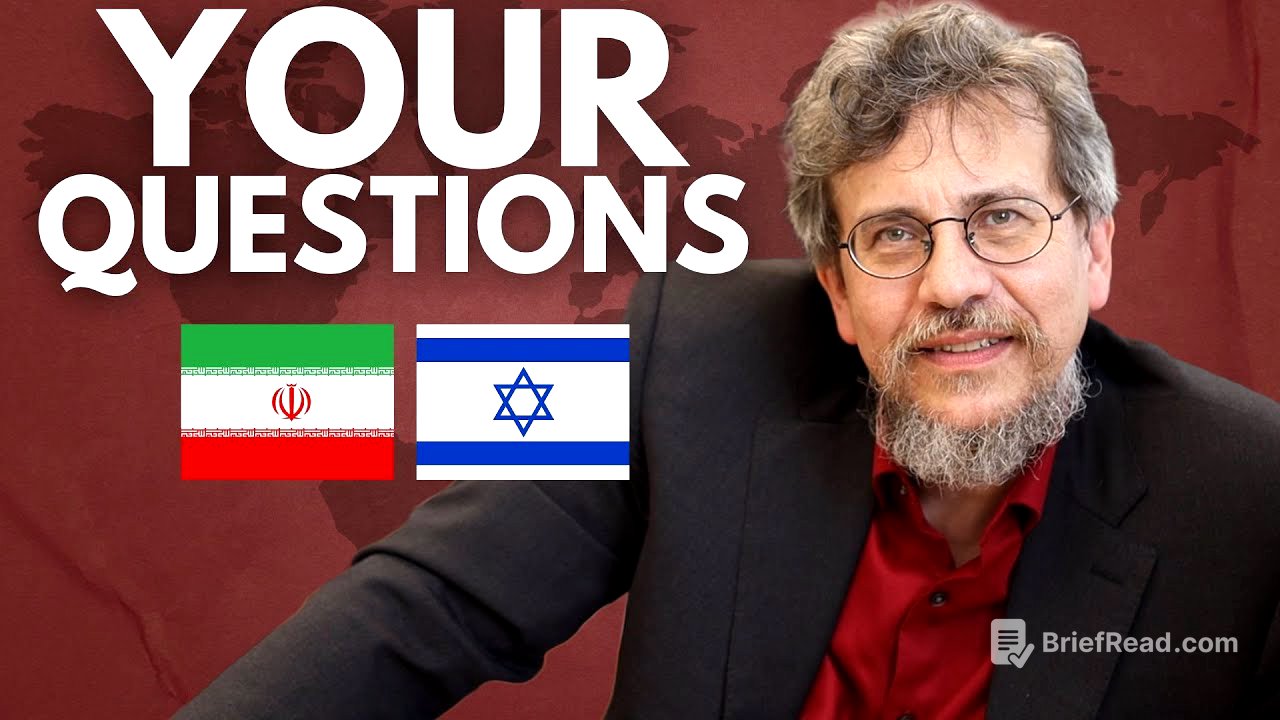TLDR;
This video features Dr. Roy Casagranda answering questions from his YouTube community about the conflict between Israel and Iran. He discusses the history of US-Iran relations since 1953, the motivations behind Western intervention in the Middle East, the shift from covert to open regime change, and the hypocrisy of promoting human rights while supporting governments that violate international law. He also addresses the double standard regarding nuclear weapons, the worst-case scenarios for the US in the conflict, the potential for a third world war, the impact of global war on food supply chains, and the likelihood of an Iranian uprising.
- US-Iran relations have been complex and fraught with tension since the 1953 CIA-backed coup.
- Western intervention in the Middle East has been driven by both political and economic motives.
- The US has shifted from covert regime change to open declarations of such intentions.
- There is a double standard regarding nuclear weapons, with Israel allowed to possess them while Iran faces intense opposition.
- A global war could have a catastrophic effect on food supply chains and everyday civilian life.
Intro: Roy Answers Your Questions [0:00]
Dr. Roy Casagranda addresses questions from his YouTube community regarding the current conflict between Israel and Iran, acknowledging a recent ceasefire following retaliatory airstrikes. He expresses gratitude for the numerous questions received and prepares to provide answers, starting with historical context.
U.S.–Iran Relations Since 1953 [1:15]
The discussion begins with the historical context of US-Iran relations since the 1953 CIA-backed coup. Initially, Britain aimed to incorporate Iran into its empire but lacked the resources. This led to the Sykes-Picot Agreement, planning the Middle East's division between France and Great Britain. Despite Russia's later withdrawal due to the Communist Revolution, they had previously joined Britain in overthrowing Iran's first attempt at democracy in 1906. The US orchestrated a coup in 1953, dismantling Iran's second democratic effort, aiming to establish its own sphere of influence. From 1953 to 1979, Iran and the US grew very close, with the CIA even headquartering its Asian operations in Tehran, including printing US currency and storing sensitive data. Iran acquired F-14 Tomcats, making it one of only two countries to possess them. This close relationship led to Iran being seen as westernizing and modernizing, yet still holding onto its cultural heritage. The 1979 Islamic Revolution caused a dramatic shift, with the US feeling rejected and Iran denouncing the US as the "Great Satan." During the Iran-Iraq War, the US supported Iraq, even bombing Iranian facilities, while Oliver North sold Iran spare parts for its US-made equipment. The Clinton administration saw a thawing of relations due to Iranian President Katami's reform efforts, including secret negotiations with the US. After 9/11, Iran condemned the attacks and offered assistance, which the US initially accepted, but George Bush Jr.'s "Axis of Evil" speech in 2002 reversed this progress, leading to a breakdown in relations that persists to this day, despite attempts to repair it, such as the 2015 JCPOA, which Trump later abandoned in 2018.
Regime Change: Political or Economic? [11:40]
The discussion explores whether Western intervention, including regime change, is driven more by political or economic motives, answering that it's both. In Central America, interventions were often driven by economic interests, such as controlling banana prices, leading to the term "banana republic." Similarly, interventions in East Asia, like China and Korea, were economically motivated. However, in the case of Iran, the motives appear more ideological. The US undermined President Katami's efforts to integrate Iran back into the global system, which could have been economically beneficial. The US's unwavering support for Israel, despite economic opportunities lost in the Middle East, and actions in Vietnam further illustrate instances where political motives outweigh economic considerations. Electoral politics also play a role, as politicians often use fear and hatred to motivate voters, which can lead to division and conflict.
From Covert to Open Regime Change [16:20]
The conversation shifts to the US's transition from covert regime change operations to openly declaring such intentions. After the fall of the Soviet Union, the US re-evaluated its approach to international politics, with Bill Clinton defunding the State Department and increasing military funding, shifting the emphasis from diplomacy to war. There was a historical understanding among US leaders to at least appear as the "good guys," upholding standards even if they were not always met. However, this approach began to erode with Reagan and Nixon, and George Bush Sr. was among the last to adhere to it. An example of this was Bush's response to the fall of the Berlin Wall, where he chose not to exploit the situation, leaving room for peaceful dialogue with Gorbachov, leading to a decade of peace with Russia. Clinton began to jettison this style of presidency, and by the time George Bush Jr. took office, there was open talk of overthrowing governments in the Middle East. Plans were drawn up to invade and transform countries like Iraq, Syria, Lebanon, Libya, Sudan, and Iran, with the goal of reshaping them in the US's image. However, the US was ultimately humiliated in Iraq and Afghanistan, halting these plans. Under George Bush Jr., the pretense of promoting self-determination was abandoned, with military power favored over diplomacy. The CIA's unchecked operations, including overthrowing democracies and waging terrorist campaigns, also contributed to this shift.
Human Rights vs Foreign Policy Hypocrisy [25:50]
The discussion addresses the hypocrisy of American leaders and media promoting human rights while supporting governments that violate international law. The US has a history of human rights violations, including slavery, genocide against Native Americans, and mistreatment of unarmed black people and immigrants. Therefore, the hypocrisy lies in the portrayal of the US as a beacon of goodness and a champion of human rights. Many Americans reconcile this by believing that committing evil is necessary for the greater good, justifying the means by the ends. Oversimplification, such as viewing monarchy as inherently bad and democracy as inherently good, also contributes to the problem.
Why Israel Has Nukes, But Iran Can’t [28:40]
The conversation explores why Israel is allowed to possess nuclear weapons while Iran faces intense opposition for pursuing enrichment. Initially, the US opposed Israel acquiring nuclear weapons, but Israel stole material from the Oak Ridge plant in Tennessee and collaborated with apartheid South Africa to develop them. Israel conducted nuclear tests in the South Atlantic in 1979, with the Carter administration doing nothing in response. The US consistently vetoes Security Council resolutions condemning Israel's actions, allowing Israel to break international laws. Israel's preemptive strikes against Gaza, Syria, Lebanon, and Iran are considered war crimes by the US's own definition. The Arab world has fought numerous wars with Israel, but the US's backing makes it impossible to win. The lesson North Korea has taught the world is that possessing nuclear weapons ensures being left alone. The opposition to Iran pursuing nuclear enrichment stems from the desire to prevent Iran from becoming untouchable. Despite intelligence reports indicating that Iran has been complying with the JCPOA since 2015, Netanyahu has repeatedly claimed that Iran is close to developing a nuclear weapon. If Iran had a nuclear weapon, Israel likely would not have attacked. Iran may now pursue nuclear weapons more aggressively, possibly through illicit means. Other countries like Saudi Arabia, Turkey, Germany, Japan, South Korea, and Indonesia may also seek nuclear weapons.
Worst-Case Scenario for the U.S. [36:50]
The worst-case scenario for the US is Iran feeling cornered and resorting to extreme measures. The attack in Qatar was a signal that Iran is willing to target not only military bases but also oil facilities, regardless of the country they are in, and disrupt global economy. The US would then be compelled to retaliate, leading to a cycle of escalation. Putting boots on the ground in Iran, a country of 90 million people, would be a disastrous and unwinnable war for the US. A worse scenario would involve Russia and China directly, although they are more likely to watch the US get bogged down and provide support to Iran.
Could This Lead to World War III? [39:55]
The conflict could potentially lead to a third world war, but it is unlikely because Russia and China do not want one. However, a mistake could happen if the US becomes too heavily involved in a war with Iran, prompting China to seize Taiwan. If Trump responds aggressively, it could trigger a shooting war with China. A miscalculation on China's part regarding Taiwan is the most likely flashpoint. If China takes Taiwan, countries like South Korea, Japan, Vietnam, the Philippines, and Indonesia would be in panic mode.
Global War and Food Supply [42:00]
A global war would have a catastrophic effect on trade and shipping, disrupting food supply chains. The Houthies' missile attacks in the Red Sea and the ship that blocked the Suez Canal demonstrate how easily trade can be disrupted. A large-scale global war would lead to shortages and delays, as trade lines for essential goods like grapes, shrimp, and salmon are cut off. While a nuclear war is unlikely, a prolonged war could result in mass starvation, with potentially a hundred million people dying each year due to the destruction of the global economic system.
Will Iranians Revolt or Rally? [44:45]
Iranians have repeatedly attempted to reform or topple their government, but bombing a country typically leads people to rally around the flag. The example of Germany in World War II illustrates how bombing can shift public sentiment from resistance to support for the state. If the ceasefire falls apart and the conflict resumes, the Iranian people are likely to rally around the flag, unless the Iranian economy collapses and people are starving. In that case, a revolution might occur, but the leadership would likely flee to Moscow or Beijing.
Wrap-Up and Final Thoughts [48:20]
Many Iranians in the diaspora and in Iran may believe that the end of the Islamic Republic is near, but that is unlikely. History is unpredictable, and while it is possible that the conflict could bring down the Islamic Republic, it is not the most probable outcome.









